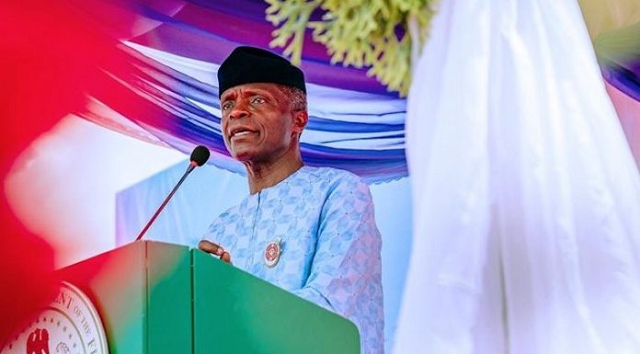Vice President Yemi Osinbajo stated that 35 percent of the sum of beneficiaries of the Federal Government’s Medium, Small Medium Enterprises (MSMEs) are female.
He said this on Thursday at the 6th anniversary of the Aisha Buhari Foundation in Abuja, the nation’s capital.
Osinbajo noted that the percentage was a manifestation of the incumbent administration’s “deliberate affirmative actions” so that women benefit proportionately from its initiatives.
In areas where women are not able to proportionately benefit, there would be a fair distribution, the vice president added.
“And of course there have been all source of other activities directed specifically by the president to ensure that women are given a fairer chance and a fairer opportunity,” he said.
Osinbajo described this as one of the milestones of the administration while listing other programs created to cater to the many needs of the country.
Among the list were the N38 billion loans that the government had disbursed in over four years, noting that the highest number of beneficiaries of one of its other poverty alleviation programs, the conditional cash transfer, were women.
He said, “A total of 38 billion in loans have been disbursed over the past for years. And of the 1.1 million beneficiaries of conditional cash transfer, 98 percent are women,” he said.
“Of the 2.4 million beneficiaries of our Government Enterprises and Empowerment Programme, 1.4 million people were women – that is 56.4 percent of beneficiaries were women.”
He highlighted the strides taken in the educational sector, stressing the commitment of the administration to ensure that no child of school age lost out in receiving basic education.
READ ALSO: NRC Suspends Abuja-Kaduna Train Service After ‘Bomb Attack’
Osinbajo harked back to the words of President Muhammadu Buhari, quoting his stance on the deprivation of school-age children’s access to education.
The number of Nigeria’s out-of-school children ranks as the highest in sub-Saharan Africa with 10,193,918 children without basic education.
The Minister of State for Education, Chukwuemeka Nwajuiba, once decried the poor state of the country’s educational system, noting that the country’s system of education “has much left to be desired, the system is characterised by high illiteracy level, infrastructural decay, and deificits.
“We have inadequate number of qualified teachers, inadequate infrastructural facilities/resources and poor funding.”
The United Nations Educational, Scientific and Cultural Organisation (UNESCO) prescribed a 15 percent to 20 percent budget allocation to the educational sector, figures that Nigeria has failed to attain, only climbing to as high as 10.28 percent.













